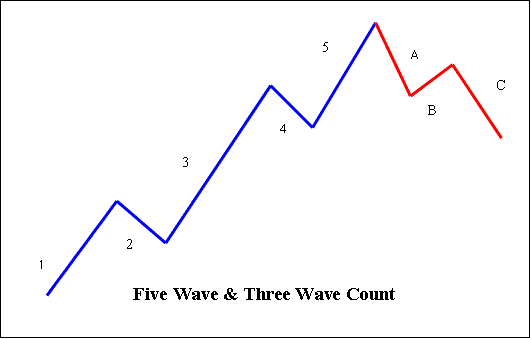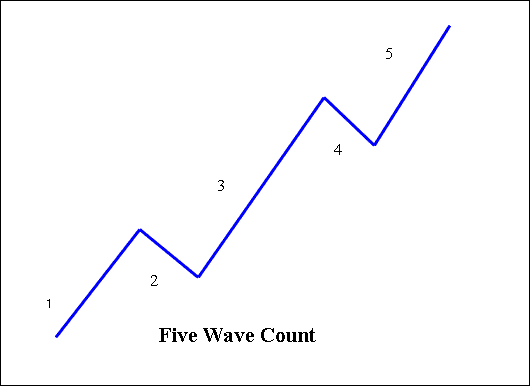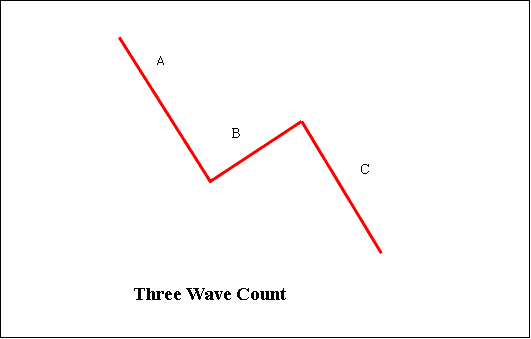The Elliott Wave Bitcoin Trading Theory
This is a form of technical analysis that Bitcoin traders and other investors use to forecast trends in the btcusd trading markets by identifying extremes in investor trading psychology, highs and lows in bitcoin trading prices, and other collective activities. This bitcoin trading theory model shows that collective human psychology develops in natural trading patterns over time, through buying and selling trading decisions reflected in market bitcoin prices.
This trading theory of analysis was developed by Ralph Nelson Elliott that is based on the theory that, in nature, many things happen in a five-wave pattern. These patterns are also applied to technical analysis, to analyze the behavior of Bitcoin market trends using the theory.
When this technical analysis theory is applied to Bitcoin, the assumption is that the btcusd trading market will advance in a pattern of five waves - three upward moves, numbered 1, 3 and 5 - which are separated by two downward moves, number 2 and 4. When the three up moves (1,3,5) are combined with the two down moves (2,4), they form the 5 Wave Elliott pattern.
The technical analysis theory further holds that each five-pattern up-move will be followed by a down-move also consisting of a three-pattern down moves - this time, three down ones are not numbered but use the letters A, B and C. So as to differentiate them from the 5 ones for the up move.
5 and 3 Wave Pattern
The main bitcoin trend will comprise five moves while the retracement will comprise three moves.
Five pattern (dominant trend) - uses 1, 2, 3, 4, 5
Three pattern (corrective trend) - uses A, B, C

This article is about how to trade online cryptocurrency markets using the Elliott Theory as the driving force of crypto trading instruments. This trading model relies heavily on looking at bitcoin trading price charts. Technical analysts use this technical analysis theory to study developing Bitcoin trends to identify the waves and discern what bitcoin trading prices may do next.
By analyzing these patterns on a cryptocurrency chart and applying the Elliott Theory, bitcoin traders are able to decide where to get in and where to get out by identifying points at which the btcusd trading market is likely to turn.
One of the easiest places to see this theory at work is in the btcusd trading market, where changing investor psychology is recorded in the form of bitcoin trading price movements. If a trader can identify repeating patterns in bitcoin trading prices, and figure out where these repeating bitcoin trading pattern is relative to the Elliot pattern counts then the trader can predict where bitcoin prices are likely to head to.
Rules for Elliott Count
Based on the btcusd trading market patterns formations formed by this theory, there are several guidelines for valid Counts:
- Wave 2 should not go below the beginning of Part 1.
- Wave 3 should be the biggest among Part 1, 3 & 5.
- Wave 4 should not overlap with Part 1.
Five pattern (dominant trend)

1: This one is rarely obvious at its inception. When the first wave of a new bull market begins, the fundamental news is almost universally negative. The previous bitcoin trend is considered still strongly in force. Fundamental analysts continue to revise their estimates lower; the beginning of a new trend probably does not look strong. Sentiment surveys are still bearish and the implied volatility in the btcusd trading market is high. Volume might increase a bit as bitcoin prices rise, but not by enough to alert many technical trading analysts.
2: This one two corrects 1, but can never extend beyond the starting point of wave one. Typically, the news is still bad. As bitcoin trading prices retest the prior low, bearish sentiment quickly builds, and "the crowd" mentality reminds all that the bear market is still in force. Still, some positive signs appear for those who are looking: volume should be lower during 2 than during 1, bitcoin trading prices usually do not retrace more than 61.8% of 1 part one gains. Bitcoin Price will reach a low that is higher than the previous low resulting into a higher low.
3: This is usually the largest & most powerful move upward, larger than 1 & 5. News is now positive and fundamental analysts start to raise estimates. Bitcoin Prices rise quickly, corrections are short-lived & shallow. Anyone looking to get in on a pullback will likely miss the boat. As 3 starts, the news is probably still somewhat bearish, & most traders remain negative: but by part three midpoint, the crowd will often join in and agree the new market sentiment is bullish. Wave three will extends beyond the highest level reached by 1.
4: This is typically & clearly corrective. Bitcoin Prices may move sideways for an extended period, & 4 typically retraces less than 38.20% of 3. Volume is well below that of wave three. This is a good place to buy a pull back if you understand the potential ahead for a Part 5. Still this 4 is often frustrating because of their lack of progress in the larger upward trend.
5: This is the final leg in direction of the dominant trend. The news is almost universally positive and everyone is bullish. Unfortunately, this is when many average investors finally buy in, right before the bitcoin trading price hits the top. Volume is often lower in 5 than in wave three, and many momentum indicators start to show divergences (bitcoin prices reach a new high but the indicators don't reach new highs). At the end of a major bullish trend, bears may very well be ridiculed, for trying to pick a market top.
Three Pattern (Corrective Trend)

A: Corrections are typically harder to identify than impulse moves. In A of a bearish market, the fundamental news is usually still positive. Most analysts see the drop as a correction in a still active bullish market. Some cryptocurrency indicators that accompany A include increased trading volume, rising & implied volatility & possibly a higher open interest in short selling.
B: Bitcoin Prices reverse and move slightly higher, which many see as a resumption of the now long gone bullish trend. Those familiar with classical technical analysis might see the peak as the right shoulder of a head & shoulders reversal bitcoin pattern. Volume during B should be lower than in A. By this point, fundamentals are probably no longer improving, but they most likely have not yet turned negative.
C: Bitcoin Prices move impulsively lower. Volume picks up, & by the third leg of C, almost everyone realizes that a bearish bitcoin trend is firmly entrenched. C is typically at least as large as A & often extends to 1.618 Fibo expansion level beyond A lowest point.
